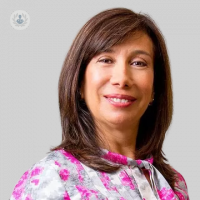Does eczema persist into childhood?
Written in association with:In one of our latest articles, Dr Emilia Duarte Williamson, a revered and mightily skilled London-based consultant dermatologist, explains how eczema appears in children, and reveals what can typically cause a sudden eczema flare up in children.

How does eczema appear in children? What does it look like?
Eczema is a very common type of skin disease, where the skin gets dry, inflamed, red, and itchy. It can appear at any age, but it is more common in children.
Up to 20 per cent of children can get eczema. Many of these patients also have asthma, and/or hay fever, as well as food allergies.
Eczema can appear in different ways, and can affect different areas on the face and/or the body. Most of the time, it tends to itch, and, as the child scratches or rubs, it can extend, get sore, and can become more inflamed and even infected.
In small babies, it commonly appears on the face. The skin has a dry and scaly appearance, and, at times, there can be well-defined pink, red, or crusted patches on the cheeks. Later on, it can appear in the skin creases, but in severe cases, it can be widespread.
Through time and persistent scratching, the skin becomes thickened, and on darker skin, the thick patches also turn hyperpigmented or darkened. At times, it is also possible to see lighter skin areas after the eczema has healed which could represent post-inflammatory hypopigmentation.
It can also show as red ill-defined areas, and sometimes well-defined round patches (discoid eczema). It can also appear as red dots, small skin blisters or vesicles. If infected or severe, it can look crusted. Sometimes, the eczema lesions change pattern in the same patient and, as a result, parents get confused thinking their child may have a different disease.
What can cause a sudden flare-up of eczema?
Some patients with eczema may have associated food allergies. Eating these foods can worsen or even trigger eczema episodes. Some patients may react to a substance that comes into contact with the skin, either as an accidental event or as something applied intentionally on the skin.
In other cases, people may have a bad reaction to a chemical substance. In other cases, people may also react to plants, herbs and other natural/organic products. Some patients may react to airborne allergens like house dust mite, animal hair, grass, pollens, and, in some people, the sun may aggravate their rashes.
Occasionally, children flare with extreme weather, the dryness caused by heaters, radiators, too much sweating with extreme heat, or, more frequently, with the seasonal weather changes.
What can parents do to help with their child’s eczema at home?
Patients should ensure that their child keeps their skin hydrated, and well moisturized, and should make sure they avoid using perfumed or coloured chemicals on the skin. It is also a good idea for parents to avoid giving their children processed foods.
It is recommendable to use cotton clothes instead of synthetic materials and to ensure that their child has a short bath every day or every other day with warm water, avoiding soaps, perfumed products, bubble baths, and shower gels.
When should I take my child to see a doctor?
You should ask to see your doctor if your child’s eczema does not improve with the above measures. Other red flags include:
- if the child’s sleep is disturbed
- if the child has frequent flares
- if the symptoms and skin signs are severe
Does eczema persist into adulthood?
It is impossible to predict if a child will suffer from long-term eczema. Close to 80 per cent of children can be cured of the skin disease, but there is great variation, and unfortunately, some patients that notice their eczema disappear in prepuberal age, can have flares of the eczema later on in life.
Dr Emilia Duarte Williamson is a highly esteemed and experienced consultant dermatologist. Consult with her today to book an appointment with her via her Top Doctors profile.


